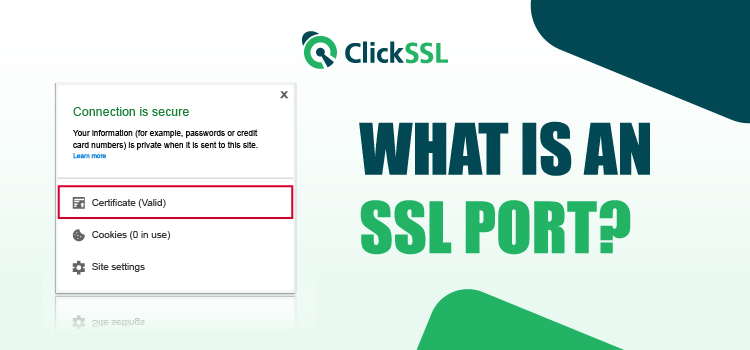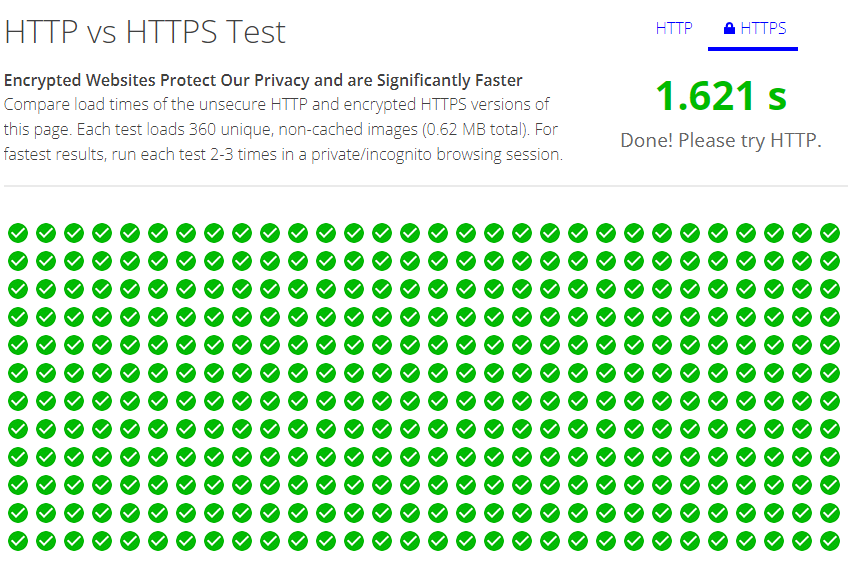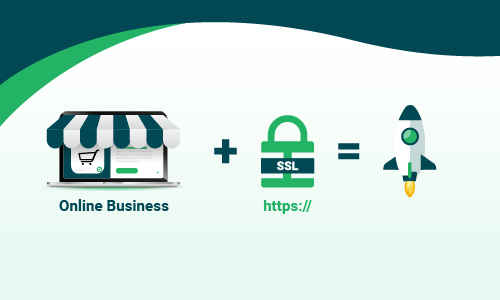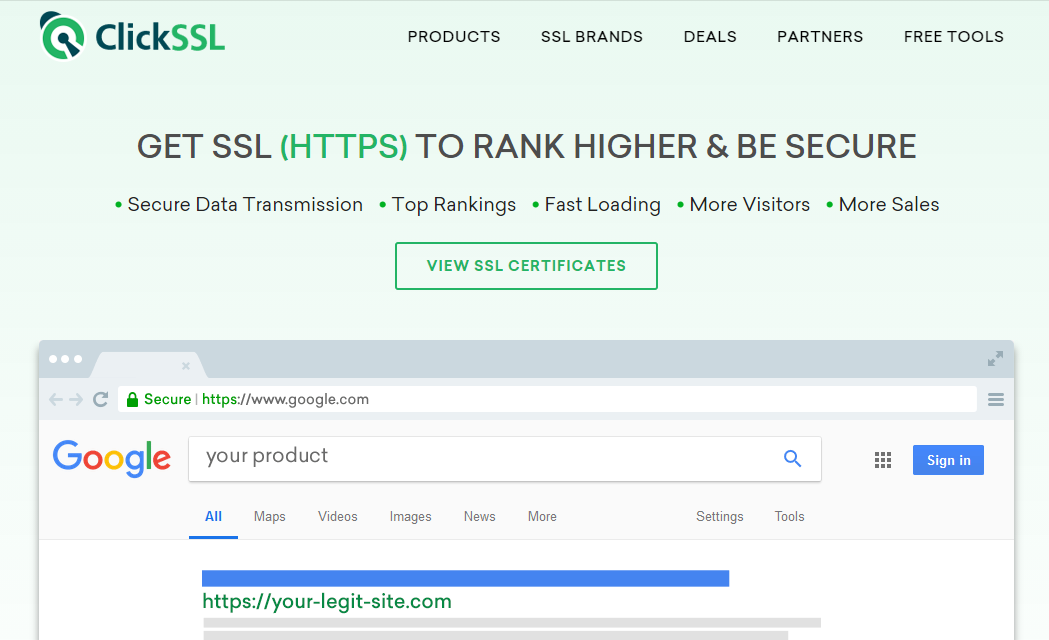Secure Socket Layer (SSL) certificates are not new anymore. Web owners are becoming aware of the importance of these certificates and how they encrypt browser-server communications to keep their website data safe from hackers.
These certificates secure digital infrastructures with 256-bit encryption security and ensure data integrity, owner authentication, and site authentication.
Privacy is maintained between the server and the client, which is very pivotal in today’s world. The SSL port is one such port that ensures this privacy. Irrespective of an SSL certificate being installed on a website or not, a port number indicates whether the connection is a secured one or not.
The default TCP port for all HTTPS (hyper-text transfer protocol secure) connections is 443, whereas HTTP (hyper-text transfer protocol) connections use the unsecured port 80.
What is an SSL Certificate Port?
There are ample internet ports, all having different numbers, and each of them offers unique services. They are also called TCP (Transmission Control Protocol) Ports.
As stated above, SSL does not have any specific port, but the HTTPS protocol, which uses SSL security, uses port 443. So, HTTPS indicates the existence of an SSL certificate in the URL.
Data communication can be done with or without the existence of an SSL certificate. But the port number indicates whether your connection is a secured one or not.
Example:
Port for SSL (port 443) identifies the security of your connections, i.e., it specifies a secured connection.
Commonly used TCP Ports:
| Port Numbers | Assignments |
|---|---|
| Port Number 0 – 1023 | These familiar ports are assigned by the Internet Assigned Numbers Authority (IANA) to some distinct server services. |
| Port Number 1024 – 49151 | These partially reserved port numbers are usually used by web developers or other companies offering special services. |
| Port Number 49152 – 65535 | These ports are used freely by web developers and other programmers. |
It’s essential to know the usual functionalities of each port number while configuring or managing web hosting accounts.
WEB
| Port Number | Function |
|---|---|
| 80 | This default HTTP port is used for transferring web pages on an unsecured connection. |
| 443 | This default HTTPS port is used for transferring web pages on a secured connection (encryption security). |
| 21 | This port is assigned FTP Protocol which is used for sending FTP commands and other data anonymously. |
| 990 | This port is used for secure FTP servers, and they use SSL/TLS certificates for data encryption. |
| 22 | This port is used for Secure Shell, logins credentials, file transfers, and port forwarding. |
| 3306 | This is the default port for MySQL protocol. |
| Port Number | Function |
|---|---|
| 110 | Used by POP3 protocol for unsecured access to email. |
| 995 | POP3 port used for SSL/TLS protocols. |
| 143 | Internet Message Access Protocol (IMAP4), mainly used for recovering emails. |
| 993 | This port connects using IMAP over SSL/TLS. (Encrypted incoming transmission) |
| 25, 80, 3535 | SMTP Relaying (outgoing) |
| 465 | SMTPS SSL Encryption (outgoing) |
cPanel
| Port Number | Function |
|---|---|
| 2082 | It establishes an unencrypted connection to the web server via HTTP and opens a connection to port 80. |
| 2083 | It establishes an encrypted connection to the webserver via HTTPS and opens a connection to port 443. |
| 2086 | WHM TCP inbound |
| 2087, 2089 | WHM SSL TCP inbound |
| 2095 | Webmail TCP inbound (unsecured) |
| 2096 | Webmail SSL TCP inbound (secured) |
A difference in terms of SSL certificate port and HTTPS port:
We live in a world of neologism, where the most convenient and popular word is frequently used. The same logic applies to TLS (Transport Layer Security) and SSL certificates.
TLS is the replacement protocol for SSL. Though the majority of the web owners prefer this updated version, they still stick to the term SSL thus making this protocol widely popular.
TLS and SSL are the same, but the term SSL certificate is widely used, and hence port 443 is listed as “SSL certificate port 443”.
It’s just a difference of terminologies, but the fact remains that HTTPS protocol which uses port 443, is sometimes termed as SSL certificate port 443.
How do HTTPS and SSL work?
The term HTTPS has just an extra “S,” which stands for security, compared to the term HTTP.
HTTPS connection = HTTP Connection + SSL Certificate Security
Thus, the protocol stacks are the same for both these terms.
| Layer | HTTP Protocol Stack | HTTPS Protocol Stack |
|---|---|---|
| Application Layer | HTTP | HTTP |
| Security Layer | – | SSL (TLS) |
| Transport Layer | TCP | TCP |
| Network Layer | IP | IP |
| Data Link Layer | Network Interfaces | Network Interfaces |
For establishing a secured internet connection, the installation of an SSL certificate is a must. When this security certificate is installed on the webserver, it authenticates the organization and the website owner for initializing the HTTPS protocol.
This, in turn, secures the data transmissions between the client and the server.
Difference between Certificates and Protocols:
The “SSL certificate” and the “HTTPS Protocol ” are two distinct factors, but they both work on establishing a secure gateway for the passing of information.
- The SSL certificate first authenticates the data. Post authentication encrypts this data and shares it on the HTTPS protocol.
- The HTTPS protocol is a digital infrastructure that uses port 443 to pass on the secured information between 2 parties, i.e., the client and the server.
Once the SSL certificate is installed and configured on the webserver, it will encrypt the information and secure it from cyber-criminals.
Distinguishing between SSL and TLS?
| SSL | TLS |
|---|---|
| SSL stands for Secure Socket Layers. | TLS stands for Transport Layer Security. |
| 2083 | It establishes an encrypted connection to the webserver via HTTPS and opens a connection to port 443. |
| SSL protocol is an old version. | TLS protocol is the current (updated SSL) version. |
| The 1st SSL protocol was developed in 1995 by Netscape. | TLS was released in 1999. |
| SSL v2.0 was released in 1995. | TLS v1.0 (upgrade of SSL v3.0) was released in 1999. |
| SSL is widely popular, and hence this term is used in a majority of security solutions. | TLS is the main technology to secure data with encryption, but since its term is less prevalent, SSL terminology is used. |
Why Should You Worry About Your SSL Port?
Don’t ignore your SSL port. It’s important for ample reasons. Firstly, HTTP has been giving away ever since browsers started displaying “Not Secure” messages on HTTP sites.
Secondly, Google too announced HTTPS as a ranking factor in SEO, and research indicates that 76% of the websites use the default HTTPS protocol.
Hence, HTTPS is far more advantageous than HTTP since a majority of the search engines, including Google, check the website’s security by its port number. Hence it makes sense to use a secured port for your website.
There are some more advantages of SSL port, which make web owners crave this security. Let’s check them out.
What is The Importance of SSL Port?
1. Safeguards your Website against Cyber-criminals with the Use of SSL:
HTTPS is an additional security layer for data protection against intruders. These cyber-criminals try their evil methods to penetrate networks and steal data and login credentials. HTTPS ensures that this sensitive data is encrypted (coded text) to prevent intruders from accessing data.
2. HTTPS is Pivotal for PCI Compliance:
If you own an e-commerce store or a company where many financial transactions occur, HTTPS is a necessity as per PCI DSS (Payment Card Industry Data Security Standard).
It eases the user’s mind while online shopping since HTTPS implementation is essential as per PCI compliance.
3. HTTPS Enhances Trust & Security:
With the rising awareness about HTTPS, the majority of the customers are hesitant to punch their credit card information on HTTP sites. They also think twice before giving their sensitive data.
HTTPS enhances site security since SSL encryption security secures website data with 256-bit encryption.
Since the existence of an SSL certificate on a website portrays trust, customers check out the trust signs like HTTPS (in the URL) and a padlock (in the address bar). They are more assured about their data privacy with HTTPS and hence trust such sites.
4. Tough Call for Hackers due to Robust Encryption:
Hackers are becoming extremely smart and trying multiple ways to penetrate networks and systems. Varied advanced encryption algorithms like DSA, RSA, etc., encrypt the data and ensure its privacy from these prying eyes.
5. Fast Loading Speed as Compared to HTTP sites:
Website loading speed is a crucial factor affecting user experience and site performance, and it also adversely affects website ranking and bounce rate and benefits competitors. Web owners resort to multiple tricks to boost their site speed.
Since users are always in a hurry to get their information, they hate the website load time (if more than 2 seconds) and shift their focus to other competitive sites.
Source: https://www.httpvshttps.com/
HTTPS is one factor that helps fast load a website and saves the user’s time.
6. HTTPS helps to Boost SEO:
A majority of the search engines love HTTPS, and hence it is favorable for SEO too.
It’s necessary to implement HTTPS precisely and avail its security and SEO benefits, which boost customers’ trust and business finances.
7. Increase in Brand Value:
A rise in SEO due to HTTPS indirectly increases the brand value of your business. Maximum customers and a good ROI follow the same since your site will be visible in SERP (search engine result pages) results, increasing your brand reputation.
HTTPS ensures a trustworthy browsing experience by showing a padlock in the address bar, which, when clicked, shows whether the connection is secured or not.
8. The Pros of Mobile Technology:
You can’t ignore the mobile internet traffic, and hence it is pivotal to make your website mobile-friendly.
Google’s Accelerated Mobile Pages (AMP) is essential to optimize your site for small screens. Google created it with the sole motto of increasing the website loading speed on mobile devices. Many may not be aware, but AMP content display is at the top of SERPs, and the same functions only with HTTPS sites.
Even the latest browsers and web apps are designed for HTTPS sites only, and hence if your site is HTTP, you are at a considerable disadvantage.
How do I Get SSL?
Multiple brands of SSL certificates are available in the market, and they secure your web infrastructure in different ways.
Example:
- Comodo PositiveSSL certificate ($8/year) secure the root domain of your business website.
- Comodo Multi-Domain SSL ($30/year) secure multiple domains and multiple sub-domains of all levels.
- Comodo PositiveSSL Wildcard certificate ($45/year) secures the root domain with unlimited sub-domains.
Thinking about where I found such attractive rates, right?
ClickSSL is a cheap SSL certificate provider offering such enticing rates on all SSL brands and products.
It also offers a reseller program which is quite profitable for IT businesses and other business owners who are willing to start their own web security business. You can set up your profit margins without any interference from ClickSSL and bloom your business.
Wrapping Up:
The HTTP protocol is an unsecured protocol and can easily be hacked by hackers because of its easy accessibility. The display of the information in plain text makes it a rich target.
But HTTPS protocol encrypts this plain text into ciphertext (coded form) with the help of an SSL certificate.
Not only does HTTPS permit secured e-commerce transactions, but the SSL security secures confidential data, thus instilling trust amongst the users.
Authentication of certificate owners and businesses is an added advantage. Thus, HTTPS enhances user trust and site security, giving web owners less choice for switching over to HTTPS.
So, grab your SSL certificate from ClickSSL now, and secure your digital infrastructure.





